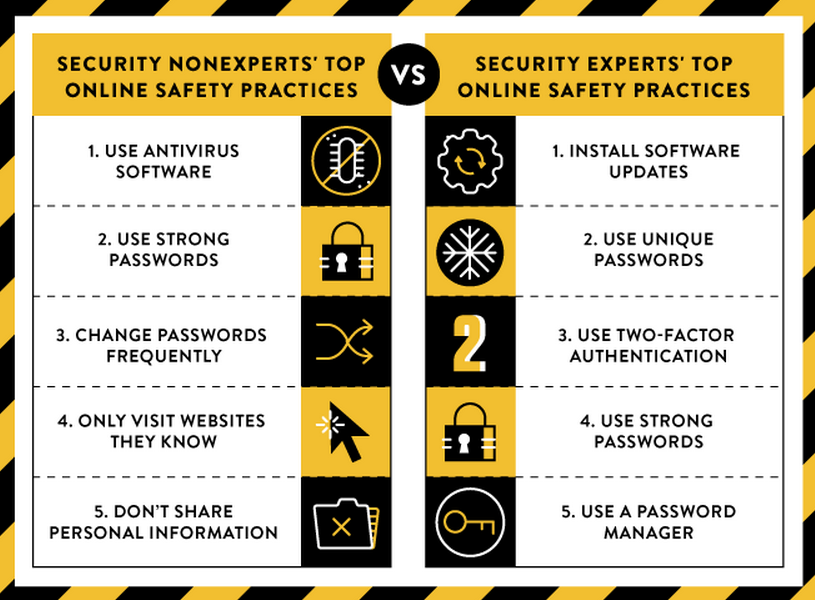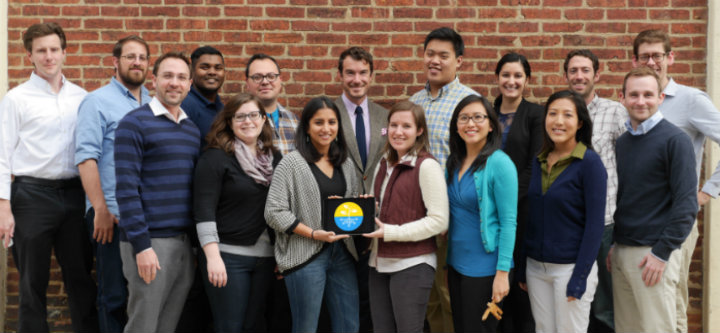Digital safety training is a social awareness issue. We are typically taught at a young age how to interact in society, but rarely are we taught how interact in the digital space. With more than three billion people around the world coming online, it is crucial today that we all understand how to interact online. In our recent virtual chat series, Mark Surman of Mozilla stressed that as more people come online exclusively through their smartphones through initiatives like internet.org, many remain unaware of the internet itself, so internet safety may not even cross their minds or becomes an ‘extra’ feature that they might not be able to afford.
Google recently conducted a study comparing digital security practices between experts and non-experts. The study included over 500 surveys of security experts and non-experts and the results are a useful examination of how expertise or knowledge reflects in practice of navigating in the digital world.
Here are my takeaways from the Google report:
Passwords, Passwords, Passwords
Both groups (experts and non-experts) highlight the need for strong passwords as one of the top 3 things to stay safe online — something malware creator Hacking Team needed a lesson on.
The experts mentioned the need for updates, unique passwords, and two-factor authentication. They highlighted the use of password managers as a way to have both strong and unique passwords.
The non-experts, on the other hand, highlighted using antivirus, changing passwords, and visiting known sites as some of their top advice other than strong passwords.
Importance of a secure connection
One of the results that I found most interesting is the fact that experts and non-experts overall recognized the value of verifying the site they are visiting by looking at the URL.
But, experts were far more likely to check if the site was connected through a secure connection, using HTTPS.
Non-experts, however, didn’t check for a secure connection. Modern browsers make recognition easy through lock icons and color coding. One explanation is that non-experts didn’t know how to check or what it means. As Google noted in the full research paper, this is interesting because verification of the site URL and secure connection (HTTPS) are right next to each other! Why wouldn’t you check both as once?
 Photo credit: Google Online Security Blog
Photo credit: Google Online Security Blog
Two-factor authentication
Google’s survey results suggest a knowledge gap for non-experts: two-factor authentication. As noted above, two-factor authentication was one of the top recommendations by experts and a growing trend in digital safety because it offers an additional, second way of verifying identity after a password. Unfortunately, setting up two-factor authentication is up to the web service provider, and not us, the end users.
While not one of Google’s conclusions, the report highlights a need for greater digital literacy training to improve digital safety. And here at TechChange we agree.
So, what does this mean for TechChange’s Digital Safety Course?
For our upcoming Digital Safety course, we are providing comprehensive training to empower the you to make informed decisions. This means that we will cover digital literacy topics, such as how the Internet and mobile networks work, as well as providing in-depth tool studies.
Most importantly, we will provide an analytical framework to assess risk and determine what tools or approaches make the most sense for a particular location and situation. What works to keep someone safe in the US wouldn’t work in countries where encryption is regulated. Lhadon Tethong, a leader in the Free Tibet movement, notes that providing basic user education to understand the risks of technology to make informed decisions is key. Whether for your personal accounts, and for your organization, especially if you are working with sensitive data, it is crucial that all your information is safe online.
We begin our Basics of Digital Safety online course on August 17! More than 30 participants from around the world have already signed up. Read more details here and join us!



